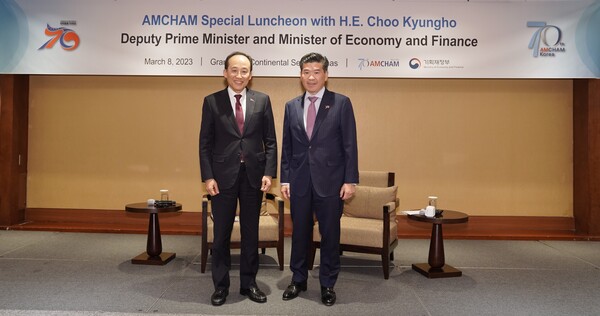
AMCHAM encourages member corporations to follow its suit
The American Chamber of Commerce in Korea (AMCHAM) announced on March 8 that it would donate to Korean victims of forced workers during Japan’s colonial rule in 1910-45.The organization said that it would also encourage member corporations to separately contribute to the Foundation for Victims of Forced Mobilization by Imperial Japan.The decision came after the Seoul administration disclosed its intention Monday to create a private fund to compensate those who were forced to serve in Japan in the first half of the 20th century, without involving responsible Japanese companies.The measure will counter the 2018 court verdict of South Korea, which urged Japan’s Nippon Steel and Mitsubishi Heavy Industry to compensate $77,000 to each of the 15 South Koran victims.Washington hailed the latest move as it would help mend fences between the country’s two close allies in the Far East at a time when its relationship with China gets sour.“As President Joe Biden and Secretary of State Antony Blinken have already mentioned in their statements, the trilateral partnership between the U.S., Korea, and Japan is key to the peace and prosperity of the region,” AMCHAM Chairman James Kim told a meeting with Finance Minister Choo Kyung-ho.“On behalf of AMCHAM, I would like to thank the Korean government for progressing this important relationship, and we support the Foundation for Victims of Forced Mobilization by Imperial Japan.”Although both Washington and Tokyo applauded Seoul’s idea, opposition sprouted in South Korea. Critics ask why South Korea should compensate victims instead of responsible parties in Japan.Disagreeing with the 2018 court rule of Korea, Japan or the Japanese firms did not pay any compensation.In particular, victims of the forced labor and their descendants expressed strong regret toward that move.“I cannot understand things at all. I have never seen anything like this in my life for 95 years,” Yang Geum-deok, one of the plaintiffs of the 2018 lawsuit, told a press conference in Korea’s National Assembly Tuesday.Out of the 15 victims who took part in the lawsuit five years ago, only three are still alive. All of them are in their 90s.이 기사를 공유합니다
Tim Kim
(voc200@gmail.com)

